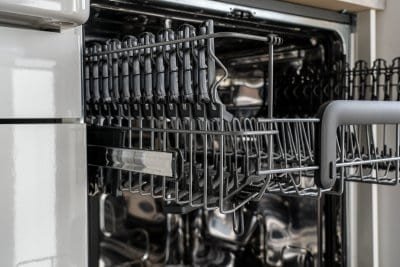It is possible to clean flatware in the dishwasher but there are a few do’s and don’ts. First only put solid flatware in the dishwasher. Do not put flatware in the dishwasher if they have pearl handles, glued joints such as knives, or weighted items.
Food remnants on sterling can cause corrosion and pit which is why it is a good idea to rinse off silver after use. Do not let your sterling silver come into contact with any other type of metal. Stainless steel will leave marks on your sterling that is very difficult to get out. Sterling and stainless can be done in the same load but make sure to keep them in separate baskets.
Finally, detergent with lemon, citrus, or phosphates will damage flatware too so refrain from using them.
Table of Contents
Which Dishwashers are Best For Crystal?
Crystal glasses are particularly susceptible to damage in the dishwasher. Traditionally heat is generated from a heating element on the bottom of the dishwasher tub.
The heat from the dishwasher can cause crystals to crack therefore dishwashers that feature an inline water heater are safer for crystals. Furthermore, food particles left in the dishwasher can etch the crystal. Some high-end dishwashers come with a cycle for use on the crystal.
How Does a Dishwasher Dry Dishes?
Modern dishwashers dry dishes using a process called condensation drying. The drying process begins with a final rinse with water that has been heated to a very high temperature. The hot water from the dishwasher heats the dishes, and when there is no more water being dispensed, they dry quickly.
Plastics have a more difficult time drying in this process because the plastic does not retain heat during the final rinse.
Rinse aids can assist in the condensation drying process by helping the water to run off dishes by reducing the surface tension of water.
How Long Should My Dishwasher Cycle Take?
Normal cycles tend to run anywhere from two hours and beyond, while express cycles run in under an hour. New dishwashers tend to run a lot longer than older units yet modern models are more energy efficient and use less water.
In January 2012 the US-based Energy Star program issued new standards, requiring dishwashers to use less water and energy. Their goal was to have dishwashers use less water and energy but to clean just as well.
Manufacturers accomplished this by extending the runtime on their dishwashers. Due to higher-efficiency motors and pumps, the machine is able to use less water and spray longer.
How Can I Make My Dishwasher Energy Efficient?
There are many ways to make your dishwasher more energy efficient.
First, don’t run your dishwasher until you have a full load. A total of 1,000 gallons of water can be saved each month by running your dishwasher only when it is full.
Choose a dishwasher that is Energy Star rated, these use 25% less energy than the mandated minimum.
Skip the pre-rinse. Most dishwashers today are powerful enough that pre-rinsing by hand is a waste of water and time.
Choose the size model that fits your needs. Compact models are more efficient than larger ones but may not be right for a large family.
Keep large kitchen appliances away from each other. For example, putting your dishwasher next to your refrigerator will make the fridge have to work harder due to the heat coming off the washer.
Finally, delay the start of your dishwasher for off-peak utility hours. This can be done by setting the delayed start time on your dishwasher which will start the cycle at the programmed time.

Are all Modern Dishwashers Basically The Same?
Modern dishwashers all function in the same basic way. When choosing a dishwasher the primary differences that set one model apart from another are durability, size, and features.
All models vary in decibels, the quieter the dishwasher the more time you can spend in the kitchen. Some models are energy star qualified and some are not. The more energy and water efficient the more money you will save in the long run.
Lower-end dishwashers have plastic interiors while all high-priced units have stainless steel basins. Stainless Steel is better for many reasons. Stainless will last longer than plastic. The unit runs much quieter than the plastic interior. Stainless Steel is capable of higher heat and water temperatures, which means cleaner and dryer dishes.
Nowadays most dishwashers function the same way and what sets them apart are their features and materials. When selecting a dishwasher be sure to pick the one that fits your needs and space.
What is The Proper Way To Load the Dishwasher for the Cleanest Dishes?
If you have dry or burnt food you should probably pre-wash your dishes. If you have a modern dishwasher that was manufactured within the last 5 years, it’s most likely powerful enough to handle food particles and clean even stuck-on food from your dishes.
Start by loading the bottom rack. Be sure to keep the larger items closer to the sides and back as they could block the flow of water to other items in the dishwasher. Bowls and smaller plates can be closer to the center.
The top rack is used primarily for mugs and glasses. Top racks are made to fit glassware so be sure not to pack everything in so close that they’re in direct contact with each other. The top rack could also be used for plastic food storage containers and anything else that could be melted by the heating element below the rack on the bottom of the dishwasher.
Your dishwasher is most efficient when it’s full. Only run the dishwasher when you have enough dishes inside to make it worth the water and energy it will use to clean them. Don’t underfill but don’t overfill either, keep your dirtiest dishes towards the center.
Do you Want to Save 5,000 Gallons of Water per Year?
Washing dishes by hand quickly became a thing of the past. Did you know that a modern, ENERGY STAR-certified machine saves you more than the tedious task? According to energystar.gov a modern dishwasher helps you and the environment in the following ways:
- 1- Shaves off your utility bills by more than $40 per year.
- 2- Saves over 230 hours of personal time, nearly 10 days. (clean, rinse, and dry each dish vs. running one load in a dishwasher)
- 3- Sanitizes your dishes. Most ENERGY STAR-rated machines raise the water temperature to 140 F for optimum wash performance. This allows for your detergent to perform at its best and disinfects your dishes.
- 4- Most importantly, a modern dishwasher saves an average family more than 5,000 gallons of water per year. Imagine the combined effect on our natural resources.
Please do not hand-wash your dishes and ask your landlord to upgrade your ancient unit which you lock and unlock by moving a lever to a modern, ENERGY STAR-rated unit.
Can I Wash My Plasticware in the Dishwasher?
You can wash your plasticware in your dishwasher. However, we do not recommend high-heat cycles such as sanitizing with your plasticware. Also, try to place plastics on the upper rack as the lower rack gets closer to the heating elements.
Meanwhile, it is a good idea to upgrade your old plastic containers. BPA might leach from old containers when they are exposed to high heat.
Overall, dishwashers spend less water compared to hand washing. Therefore, we recommend using your dishwasher for plasticware.
Are you Panicked To See Water Dripping from the new-in-box Dishwasher?
Don’t be alarmed – All serious manufacturers quality test each dishwasher they produce. As a result, some test water remains behind. The amount can vary from 2 cups to a gallon. Therefore, it is common that you will notice water dripping out of the expensive Miele dishwasher new in its box when delivery people are taking it off their truck ( when they tilt the dishwasher water from the Rhein River might go into the dishwasher drain..).
How To Compare Sound Levels of Dishwashers?
Many people secretly wish for the quick “death” of their clunky dishwashers. In the last 10 years, there have been many advances in dishwasher technology which help us get better cleaning while preserving tranquility.
There are multiple factors that make modern dishwashers super quiet:
- Quality of insulation
- Quality of pump system
- Intelligent spray arm design to optimize water flow to reduce noise
- Sound dampening design of the tub
- Use of basic filtering rather than hard food disposers (especially by European manufacturers)
The quietness of a dishwasher is measured in “decibels” (the lower the number the quieter the dishwasher). While it is helpful to rely on manufacturers’ published ratings, we don’t want you to go crazy about comparing a 44 dB product vs 42 dB as your particular loading pattern can swing numbers (among other variables).
Here is a simple guide to making sense of sound levels (decibel rating) on dishwashers:
- 45 dB and under – virtually silent
- 45 – 50 dB – whisper quiet
- 50 – 60 dB – normal conversation

Top 3 Reasons Why You Should Use the Water Softener in Your Dishwasher?
Hard water is the number one enemy of dishwashers. Water softener in your dishwasher prevents the accumulation of minerals that clog up tiny nozzles, pump, and drain systems. In addition, soft water will allow soap to do its job by forming suds.
Rinse-aid agents help remove water from dishes and promote faster drying, which in turn makes it less likely for deposits to form spots on your dishes. In order to guarantee success it is best to use a rinse aid along with a water softener.
Water softener systems in modern dishwashers store specially formulated dishwasher salt in your dishwasher. The system will release the appropriate amount of salt during the wash cycle for optimum cleaning.
Alternatively, if your dishwasher does not have a water softener you can use a supermarket variety of detergents with a water softener. This would not be an ideal solution over a machine-regulated water softener but might help you get better dishwashing results.
Do I Need To Use Rinse Aid in My Dishwasher?
Rinse aid helps you get spotless results from your dishwasher. Rinse-aid agents reduce the surface tension of water. As a result water drops flatten (rather than forming beads) exposing more area to air and causing water to drain. Since water does not linger your dishes are less likely to have spots and film on them.
If you don’t use a rinse aid your dishes will still dry. So, if you are not experiencing water spots on your dishes and are happy with drying performance you may not need to use any rinse aid agents. However, don’t take a chance with your fine china and expensive glasses. Add some rinse aid to your dishwasher to get a “shiny” outcome.
Many supermarket variety brands introduced detergent tablets that combine rinse aid. This might be a good solution for everyday use. Nevertheless, built-in rinse aid dispensers on modern dishwashers work better as they regulate the timing and volume of the rinse aid agent released.
You might also observe that plastics such as Tupperware still have water beads after the drying cycle. Here is why – plastics are hydrophobic and are less likely to attract to water and take longer to dry compared to glass surfaces (hence the beads of water form on them).


1 thought on “Will My Dishwasher Damage My Flatware”
Comments are closed.